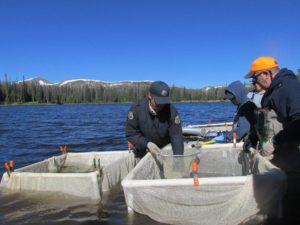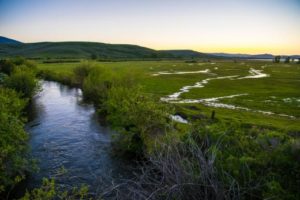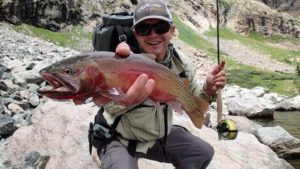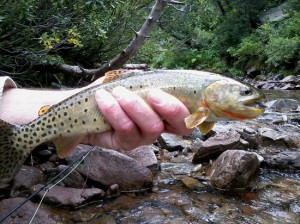The greenback cutthroat is one of last three remaining species of cutthroat trout that is native to Colorado. Their populations were decimated during the initial settling of the west, and for a period of time this species was thought to have become extinct. Later, greenback cutthroats were believed to have been rediscovered, but this proved to be case of mistaken identity. Genetic testing later provided evidence that this “old Strain” of greenback cutthroats were in fact Colorado Cutthroats, an entirely different subspecies of cutthroat trout. It wasn’t until later that a small population of true native greenback cutthroat were discovered in Bear Creek near Colorado Springs. Since this discovery there has been a significant effort to capture the genetic pool of these true greenback cutthroats, breed them in controlled environments, and repopulate native waters with these trout. Much of this work is thanks to the Greenback Recovery working group, currently lead by Colorado TU Grassroots Coordinator, Dan Omasta. This working group is a collaborative effort; including organizations such as Trout Unlimited, the Division of Fish and Wildlife, the Forest Service, and front range CTU chapters. This partnership forms a unified front to work as a single point of contact. The Greenback Recovery Working Group has been effective because they are able to provide much needed volunteers, address funding needs, enhance communications, and work on grant writing across chapters as a single entity.
One of the most significant ongoing projects is the reintroduction of native greenback cutthroat trout to Zimmerman Lake. This lake serves as a spawning ground for these cutthroat, where fertilized eggs are then collected and brought to the Leadville hatchery. The resulting fry are then reintroduced to other native streams.
Another substantial project conducted by the Greenback Recovery Working Group in partnership with Western Native Trout Initiative entails installing 30 temperature loggers into local streams. This project will help Colorado Trout Unlimited collect data in order to evaluate streams for reintroduction, monitor progress, and over time measure the impacts of climate change. There are many other ongoing and upcoming projects that the Greenback Recovery Working Group is tirelessly working on in order to successfully reintroduce native greenback cutthroat trout.
Soon under the Endangered Species Act, the Department of Fish and Wildlife will be forced to review the status of greenback cutthroats. Currently greenback cutthroat trout are listed as a threatened species, but if they are downgraded to an Endangered species there could be significant consequences. It would take significantly more time and money to acquire permitting and conduct environmental impact assessments. Additionally, if this species becomes endangered, it may no longer be targeted by anglers. This may provide disincentives to protecting this native cutthroat species and limit fishing areas across Colorado. This would hinder one of the most substantial trout recovery efforts even undertaken in Colorado, but with proper funding and volunteers the Greenback Recovery Working Group should continue to successfully reintroduce this cutthroat species thought to have been lost.
To get involved or volunteer please contact Dan Omasta, DOmasta@tu.org, to learn about various opportunities!






 This Spring, he graduated from Western State University in Gunnison majoring in Chemistry with an emphasis in Biochemistry. But he's leaving behind an incredible legacy of coldwater conservation leadership. In 2013, Adam founded The Gunnison Sockeyes, the first TU Costa Five Rivers collegiate club in the nation to found their club based on conservation rather than fly fishing. The club boasts over 160 members and has logged in excess of 220 man hours of service work in the Gunnison Watershed in the fields of Lake Trout Removal, Kokanee Salmon Spawning, Electroshocking, Stonefly Reintroduction and River Clean Ups.
This Spring, he graduated from Western State University in Gunnison majoring in Chemistry with an emphasis in Biochemistry. But he's leaving behind an incredible legacy of coldwater conservation leadership. In 2013, Adam founded The Gunnison Sockeyes, the first TU Costa Five Rivers collegiate club in the nation to found their club based on conservation rather than fly fishing. The club boasts over 160 members and has logged in excess of 220 man hours of service work in the Gunnison Watershed in the fields of Lake Trout Removal, Kokanee Salmon Spawning, Electroshocking, Stonefly Reintroduction and River Clean Ups. Growing up on the banks of the Mississippi and experiencing its periodic floods gave me no background for understanding the water scarcity issues of the west. When the mighty Miss and its tributaries flooded they used to let us older boys out of school and permit trustee crews from the state prison to help sandbag. It was usually a problem of too much water, so I was fascinated by the complexity of water law created by the scarcity of water and the mission of TU to conserve and correct the mistakes of the past just seemed to me to make manifest sense.
Growing up on the banks of the Mississippi and experiencing its periodic floods gave me no background for understanding the water scarcity issues of the west. When the mighty Miss and its tributaries flooded they used to let us older boys out of school and permit trustee crews from the state prison to help sandbag. It was usually a problem of too much water, so I was fascinated by the complexity of water law created by the scarcity of water and the mission of TU to conserve and correct the mistakes of the past just seemed to me to make manifest sense. My favorite fishing spot is any spot I happen to be in which harbors fish. I advocate carrying a flyrod in every vehicle because you never know when you will run into a fishing emergency! Although exotic locales beckon to many I have trouble getting too far away from my home rivers - and ponds. I flyrod a lot of local natural area ponds for warmwater species too. Also take a trip to Canada each June with a couple of RMF's founding fathers, but home waters are the preferred locales since they are close.
My favorite fishing spot is any spot I happen to be in which harbors fish. I advocate carrying a flyrod in every vehicle because you never know when you will run into a fishing emergency! Although exotic locales beckon to many I have trouble getting too far away from my home rivers - and ponds. I flyrod a lot of local natural area ponds for warmwater species too. Also take a trip to Canada each June with a couple of RMF's founding fathers, but home waters are the preferred locales since they are close. , paired with the direction of a dedicated college adviser (who happens to be a fisheries economist) shaped my undergraduate studies and kindled my focus in conservation.
, paired with the direction of a dedicated college adviser (who happens to be a fisheries economist) shaped my undergraduate studies and kindled my focus in conservation.










 In the South Platte basin, Colorado TU and chapters worked to engage young, inner city, girls through the great outdoors by introducing them to fly fishing and conservation; CTU worked with Colorado Parks and Wildlife to reintroduce the Colorado state fish, Greenback Cutthroat Trout, to it's native watershed along the Front Range; Trout Unlimited tackled abandoned mine issues, and various chapters worked to repair their homewater streams from the devastating floods of 2013.
In the South Platte basin, Colorado TU and chapters worked to engage young, inner city, girls through the great outdoors by introducing them to fly fishing and conservation; CTU worked with Colorado Parks and Wildlife to reintroduce the Colorado state fish, Greenback Cutthroat Trout, to it's native watershed along the Front Range; Trout Unlimited tackled abandoned mine issues, and various chapters worked to repair their homewater streams from the devastating floods of 2013. In the Colorado River basin, TU helped secure protections for the Roan Plateau and Thompson Divide from harmful oil and gas development, worked with local ranchers and farmers to improve the health of the Upper Colorado while enhancing agriculture water usage. TU also helped lead the Learning by Doing initiative that, among other things, secured $8 million in funds to protect and restore the Upper Colorado River.
In the Colorado River basin, TU helped secure protections for the Roan Plateau and Thompson Divide from harmful oil and gas development, worked with local ranchers and farmers to improve the health of the Upper Colorado while enhancing agriculture water usage. TU also helped lead the Learning by Doing initiative that, among other things, secured $8 million in funds to protect and restore the Upper Colorado River. In the Rio Grande basin, Trout Unlimited worked to protect the Great Sand Dunes Cutthroat from potential changes in the environment. The Rocky Mountain Flyathlon came to Saguache for the annual race and fishing events that help raise money for Colorado TU's work in protecting native trout and their habitats. The local chapter and Trout Unlimited also worked to repair sections of the Conejos and ensure that winter flows were hospitable for trout.
In the Rio Grande basin, Trout Unlimited worked to protect the Great Sand Dunes Cutthroat from potential changes in the environment. The Rocky Mountain Flyathlon came to Saguache for the annual race and fishing events that help raise money for Colorado TU's work in protecting native trout and their habitats. The local chapter and Trout Unlimited also worked to repair sections of the Conejos and ensure that winter flows were hospitable for trout. There is a small but dangerous movement brewing in this country that would transfer ownership of federal public lands to the states. TU and many other
There is a small but dangerous movement brewing in this country that would transfer ownership of federal public lands to the states. TU and many other 
